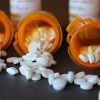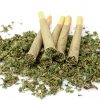Does your antibacterial soap or body wash actually do more harm than good? The Food and Drug Administration (FDA) is calling on all soap makers to ensure that all added ingredients, such as triclosan, are safe and effective at killing germs. "The proposed rule covers only those consumer antibacterial soaps and body washes that are
Does your antibacterial soap or body wash actually do more harm than good? The Food and Drug Administration (FDA) is calling on all soap makers to ensure that all added ingredients, such as triclosan, are safe and effective at killing germs. "The proposed rule covers only those consumer antibacterial soaps and body washes that are used with water. It does not apply to hand sanitizers, hand wipes or antibacterial soaps that are used in health care settings such as hospitals," the FDA shared in a blog post. The FDA and other experts have worked to set regulations on the use of triclosan since 1978, and they hope to have a rule established by 2016. While the effects of triclosan on humans aren't yet known, Mae Wu, a lawyer for the National Resource Defense Council's health program, points out that triclosan can cause hormonal changes in animals, so the link to humans needs to be explored. Wu lends further support, saying, "In addition, laboratory studies have raised the possibility that triclosan contributes to making bacteria resistant to antibiotics. Such resistance can have a significant impact on the effectiveness of medical treatments." This is a concern, as antibiotic-resistant infections have also been on the rise. The FDA's Dr. Sandra Kweder says there are about 2,000 types of soaps that have triclosan, but it's not too hard to find versions that don't have the chemical. If you are unsure, it's suggested that you use plain soap and water to clean your hands.
NBC News, 12/16/13









Leave a Comment
Your email address will not be published. Required fields are marked with *